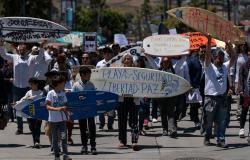
Within the hyper-competitive culture of top American universities, it is considered the highest achievable: being the ‘best’ student of your class valedictorian-give a speech at the annual diploma ceremony. At the University of Southern California (USC), this honor would go to Asna Tabassum this year. The 21-year-old master’s student in biomedical engineering will graduate next month with an almost perfect grade point average and was selected from a group of more than a hundred candidates.
However, Tabassum will not speak on May 10 during the so-called commencement ceremony. The special committee that selected her read her essay and looked at all kinds of academic achievements, but not her social media. Others did the latter and drew attention to her Instagram account, where they found a link at the top to a presentation by pro-Palestinian activists. It advocated “Palestinian liberation and the complete abolition of the State of Israel.”
After an online campaign by some Jewish students against Tabassum, the USC announced last Monday that it would cancel the valedictorian speech this year “for security reasons”. After much more commotion about that intervention, USC decided to cancel all invited speakers for the main program on Friday. The graduates and their family members will therefore miss a speech by Hollywood director and USC alumnus Jon M. Chu (known from the film Crazy Rich Asians).
Tension over ‘Gaza’
The normally festive graduation season will be under high tension on many more campuses this spring. Since the October 7 Hamas attack and the subsequent Israeli retaliatory war on Gaza, American universities have been grappling with the conflict. Students and teachers who, among other things, sit-ins draw attention to the Palestinian cause, clash with other students, teachers, administrators and donors who call their protests anti-Semitic. For example, Trojans for Israel, a group of Jewish USC students that campaigned against Tabassum, stated that “rhetoric that denies the right of self-determination of the Jewish people or calls for the destruction of the only Jewish state in the world should be denounced as anti-Semitic bigotry.”
Tensions over Gaza have remained constant in recent months and are rising again as the graduation ceremonies approach. These well-attended meetings, the universities fear, could be hijacked by demonstrators who want to express their opinions about the conflict in the Middle East. While this “the most important and exciting event of the academic year,” USC said in its initial statement, “should revolve around the tremendous achievements of our more than 19,000 graduates.”
Protest camp cleared
The academic world is therefore preparing for an eventful end to the year. At the University of Michigan, flags and banners are prohibited and demonstrations are only allowed in special areas, far away from the festivities. “We cannot have one group imposing conditions and attempting to disrupt important milestones like the graduation ceremony to spread its views,” Columbia President Minouche Shafik warned in a letter Monday.
At her New York university, mass gatherings are almost as impossible to organize now as they were during the pandemic. On Monday, Columbia decided to move all lectures and working groups online again, after calling in the police to clear a pro-Palestinian protest camp last week. More than a hundred people were arrested on the lawn, which was renamed a “liberated area” – and temporarily suspended.
With this strict action, Shafik seemed to want to prevent her from receiving the same reproaches as other university presidents at the end of last year. Her colleagues at Harvard, MIT and Penn were grilled by Republicans during hearings in the House of Representatives last year. They portrayed their approach to the pro-Palestinian campus protests as too weak, after which two of these top administrators ultimately resigned. However, the police action on Columbia seems to have done nothing to dampen the demonstrations: they continue and spread to other universities, such as NYU and Yale.
Also read
Israel divides Harvard campus. ‘You support terrorists’
Student Ezra Dayanim is now happy that his grandparents are not coming to his graduation ceremony at Columbia, he said on Tuesday The Wall Street Journal. The student of Jewish descent already assumes that President Shafik will be booed on stage, he says in the business newspaper, and hopes that there will not be more unrest. “I can’t imagine my grandparents being able to walk quietly across campus here.”
Such concerns about a possible unsafe atmosphere also led USC to cancel all speakers. Although this is at odds with freedom of expression, the university acknowledged in a statement, “at USC, the safety of our community always comes first. The university’s baseline is to reduce safety risks as much as possible so that expressions can flourish. [..] In the rare cases where the dangers are judged to be too great by our safety experts, the university has a responsibility to protect students, faculty, staff and guests.”
Ideological discomfort
In the past week, pro-Palestinian students and teachers at USC have interpreted this decision as pro-Israeli censorship and Muslim hatred. Valedictorian Asna Tabbasum comes from a South Asian family near Los Angeles, wears a headscarf and took the minor ‘Resistance against genocide’ at USC. The local branch of Muslim interest group CAIR called the criticism of Tabassum “unfair and defamatory.” It is said to be “barely veiled Islamophobia and anti-Palestinian racism that is being deployed against students across the country who speak out for human rights – and for the humanity of Palestinians.”
Tabassum itself feels “betrayed” by the university, which is said to have “succumbed to a hate campaign”. In a written statement, she called on her classmates “to continue working towards a world where cries for equality and human dignity are not portrayed as expressions of hatred. I challenge us to respond to ideological discomfort with dialogue and learning, not with bigotry and censorship.”
To share
Email the editor
Tags: American universities high tension fear students speaking Gaza war graduation ceremonies
-




